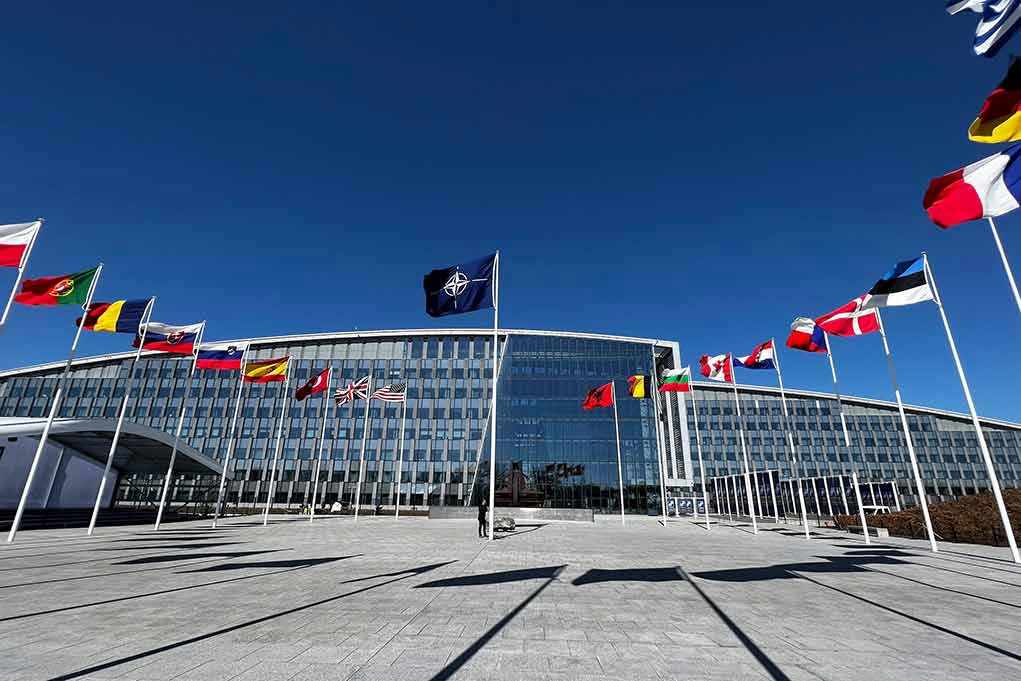
President Trump’s bold demand that Ukraine surrender its NATO ambitions and Crimea claims has ignited a firestorm among globalists and establishment elites, but for many Americans, it’s a long-overdue challenge to endless war and reckless foreign entanglements.
Story Snapshot
- Trump calls on Zelenskyy to abandon NATO pursuit and claims to Crimea, pressuring Ukraine to accept peace on new terms.
- Putin signals willingness to allow U.S. and Europe to offer “NATO-style” security guarantees if Ukraine drops its NATO bid.
- European leaders gather at the White House in an unprecedented summit to broker a settlement.
- The outcome could mark a turning point in America’s foreign policy and the future of European security.
Trump Puts America First by Demanding an End to Endless War
On August 17, President Donald Trump took to Truth Social, urging Ukrainian President Volodymyr Zelenskyy to “end the war almost immediately” by giving up Ukraine’s pursuit of NATO membership and dropping its claim to Crimea. This direct call, made just before a high-stakes White House summit, signals a sharp break from the failed interventionist strategies of the Biden years. Trump’s critics accuse him of undermining Ukraine, but his supporters see a president finally willing to prioritize American interests and avoid further entanglement in costly, unwinnable wars. By refusing to rubber-stamp globalist ambitions, Trump is challenging the status quo that has drained U.S. resources and left American families footing the bill for endless conflict.
The Trump administration’s peace proposal has sent shockwaves through both Washington and Europe. Trump’s plan would have Ukraine withdraw its bid to join NATO—a move Russia has demanded for years—and accept a loss of claim to Crimea in exchange for U.S. and European “Article 5-like” security guarantees. While European leaders, including NATO Secretary General Mark Rutte, French President Emmanuel Macron, and British Prime Minister Keir Starmer, have convened at the White House for these negotiations, the pressure is squarely on Zelenskyy to make unprecedented concessions. Trump’s approach, rooted in direct talks with Putin and a willingness to upend diplomatic orthodoxy, reflects his campaign promise to put America’s security and prosperity first, even if it means upending old alliances or angering D.C. insiders.
Ukraine Under Pressure: The Cost of Rejecting NATO and Territorial Claims
For Ukraine, Trump’s proposal represents a bitter pill. Since Russia’s 2014 annexation of Crimea and the 2022 invasion, Ukraine has fought for sovereignty and Western integration. The prospect of abandoning NATO membership and accepting Russian control over Crimea and the Donbas region is deeply unpopular among Ukrainians. Yet, after years of war, Western aid fatigue, and lackluster results from previous peace efforts, Zelenskyy now faces overwhelming diplomatic pressure. The U.S., no longer willing to offer an open-ended military commitment, is instead proposing “NATO-style” guarantees without extending full membership—effectively rewriting the rules of European security. While some see this as a pragmatic path toward peace, others warn it could leave Ukraine exposed, embolden Russia, and signal that American security guarantees are negotiable on the world stage.
Putin’s willingness to allow such guarantees marks a significant shift in Russian negotiating posture, but the enforceability of these “Article 5-like” pledges remains uncertain. Analysts question whether promises on paper can truly replace the deterrent effect of NATO’s collective defense, especially after years of mixed signals from Western governments. For conservative Americans, the debate underscores the perils of globalist overreach and the importance of robust, clearly defined national interests. The administration’s stance prioritizes American security and fiscal sanity, rejecting the blank-check approach that has driven up inflation and diverted resources from urgent domestic needs.
Diplomatic Gamble: What’s at Stake for U.S. Security and Values?
The stakes of the White House summit are enormous—not just for Ukraine, but for the future of U.S. foreign policy and the global balance of power. Trump’s critics warn that forcing Ukraine to accept territorial losses could set a dangerous precedent, but supporters counter that endless military aid and escalation are unsustainable and threaten to erode America’s own security and economic foundations. European leaders, wary of both Russian aggression and American disengagement, are left to broker a compromise that few believe will satisfy all sides. As negotiations continue, the world watches to see if Trump’s America First approach can deliver a lasting peace—or if the old guard’s failed playbook will once again prevail.
Trump Tells Zelenskyy To Drop NATO Dreams In Pursuit Of Peace https://t.co/rGlt1toDK6
— IJR (@TheIJR) August 18, 2025
The administration’s willingness to challenge entrenched interests and demand accountability from allies is a welcome change for conservatives long frustrated by unchecked globalism and bureaucratic overreach. As the deal takes shape, questions remain about the durability of any settlement and the risks of appeasing aggressive regimes. Yet, for many, Trump’s approach represents a long-overdue course correction—one that puts American families, values, and constitutional principles above foreign adventurism and elite consensus. Whether or not the summit yields a final agreement, it marks a pivotal moment in the fight to restore common sense and constitutional government at home, while ending the cycle of endless war and globalist folly abroad.
Sources:
Trump Urges Zelenskyy to Drop NATO Bid and Crimea Claims to End Russia-Ukraine War (TIME)
Ukraine-Russia: Steve Witkoff, NATO Security Guarantees (CBS News)




